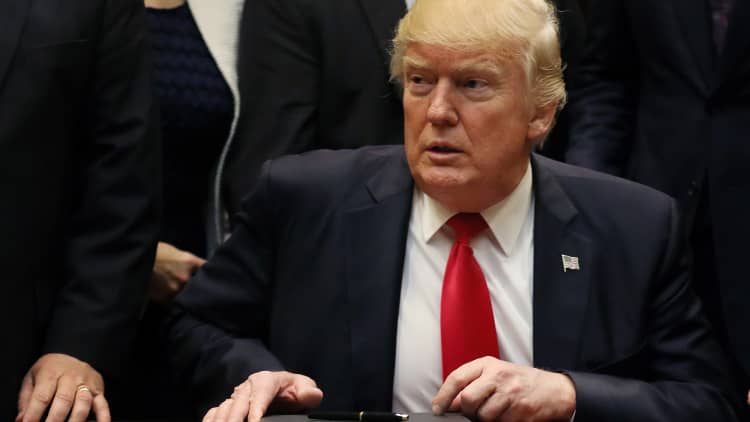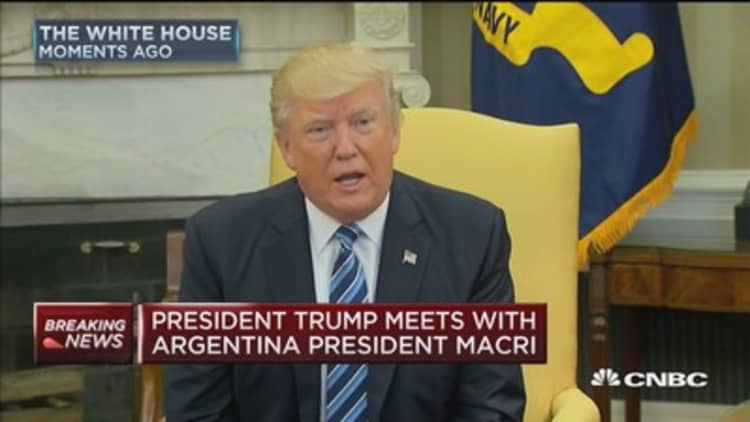
When President Donald Trump said he would revive the embattled Export-Import Bank this month, it marked an about-face on an institution that Trump once slammed as "featherbedding" for big corporations.
The decision was a win for American industrial titans General Electric and Boeing, which have foreign customers that use the bank's loans to buy products. Just a day before Trump first announced he would fill vacancies on the Ex-Im Bank's board, the president met with former Boeing CEO Jim McNerney, who previously supported the bank in the face of conservative opposition on Capitol Hill.
It is not clear whether the pair discussed the Ex-Im Bank at that meeting or how much McNerney or GE CEO Jeff Immelt — a member of a White House economic advisory group — affected Trump's stance on the issue. But the episode underscores a pattern whereby Trump, whose policy views are notoriously flexible, often modifies his political positions after face time with high-level executives.
The businessman Trump has positioned his White House as uniquely business-friendly during his first 100 days in office, frequently showcasing meetings with executives as he aims to chop corporate tax rates and slash regulations. Trump's proximity to executives and his wish for splashy policy announcements have given major corporate CEOs a front seat to some policy decisions, experts said.
"Smart CEOs will find a personal connection with him and have a lot of influence through direct
The White House did not respond to a request for comment on this story.
It's normal for presidents to take input from key American executives. But Trump has gone "further than most in formalizing the role and setting up an advisory committee of billionaires and top CEOs," said Darrell West, vice president and director of governance studies at the Brookings Institution.
One of the president's economic advisory councils, chaired by billionaire Blackstone CEO Stephen Schwarzman, features the CEOs of JPMorgan Chase, General Motors, Walt Disney and Wal-Mart, as well as McNerney. In recent months, Trump has held listening sessions with executives from the technology,
The Ex-Im Bank is just one case in which Trump appeared to take feedback from CEOs into his policy decisions.
West notes that Trump ordered a review of the H-1B visa program used widely at Silicon Valley technology companies, rather than taking more drastic steps that may endanger the program, after he met and discussed immigration with executives from companies such as Amazon, Apple, Facebook and Google parent Alphabet. Trump opposed the program on the campaign trail, saying it hurt American workers in favor of cheaper foreign workers.
After meeting with pharmaceutical executives Trump dropped his support for a plan backed by Democrats that would let Medicare negotiate bulk discounts for prescription drugs.
Trump's administration is in the process of making other major policy choices with corporate executives lobbying one way or another. Trump has yet to announce whether the United States will pull out of the landmark Paris climate agreement, which Trump pledged to "cancel" as a candidate. GE's Immelt and oil behemoth Exxon Mobil have spoken out in favor of upholding the deal.
GE did not comment specifically on what Immelt has discussed with Trump in person. It pointed CNBC to a CNN interview in which Immelt said CEOs should largely "kind of keep their head down" but stand up to the president when they feel it is warranted.
"So, I don't think it's something we should do every day, but I do think we're also stewards of our companies, we're representatives of the people that work with us, and I think we're cowards if we don't take a position occasionally on those things that are really consistent with what our mission is and where our people stand," Immelt said.
Dow Chemical has also urged the Trump administration to "set aside" the findings of a scientific study that said a family of pesticides is harmful to roughly 1,800 threatened or endangered species. Dow CEO Andrew Liveris heads a Trump manufacturing working group, but it is unclear if he brought that issue up with the president personally.
Dow did not respond to a request for comment on Liveris' conversations with Trump. He told CNBC's "Squawk on the Street" Thursday that he is "pleased to see" the policy changes Trump has pushed in the White House.
"I am very much involved, of course, for the company in what's going on in the White House," he said. "And I'm very pleased to see the [regulatory] reform agenda; I'm pleased to see what's going on in workforce training and activities there. Both of those I'm heavily involved in with the manufacturing initiative, as are 30 other CEOs."
Brookings' West said meeting with CEOs, who often consider their own companies before consumers, can create problems in economic policy. Trump has included some labor leaders, for example, in his policy meetings, but executives heavily outnumber them.
The president "risks getting a one-sided view of policy" without more input from groups representing consumers or workers, he said.
The White House and a spokesman for an organization where McNerney is a trustee did not respond to requests for comment on this story.
Watch: Trump changes mind on leaving NAFTA



